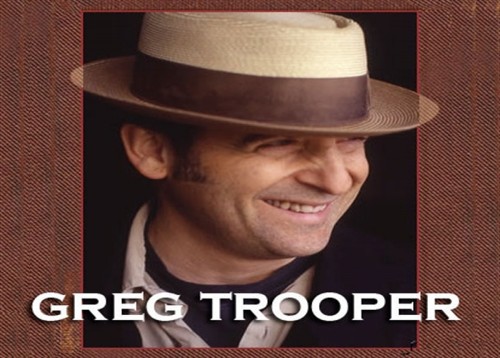In the fall of 2004, Greg Trooper tried to settle in to a moment not easily settled into - his first full-on recording session in the basement studio of soul producer and songwriter Dan Penn. Author of I’m Your Puppet, Do Right Woman and Dark End of the Street; producer of Solomon Burke, Irma Thomas and the Box Tops; colleague of Jerry Wexler and Chips Moman, Penn made a huge impact on soul music, but he’s mighty low-key about it. He’s a humble guy. But that didn’t necessarily make it easier for Troop.
Musicians regard their heroes in infinitely varied ways, but they all have them. It’s almost a job requirement. Trooper has described his own holy trinity as Otis Redding, Hank Williams and Bob Dylan. Below that is that cascade of demi-gods that any lover of old records can conjure in his own mind’s eye. Near the top, for Trooper, would be Penn. And there he was on the other side of the double wall glass, as Trooper spread his feet, swung his guitar under his arm and addressed the vocal mike.
“Uh, Greg you gonna’ stand and sing?’” Trooper imitates the Alabama drawl that came through his headphones. “…and I said, ‘yeah.’ and he goes, ‘Why don’t you take a seat? Have a seat in a chair. You’re gonna’ be standing all week. Why don’t you sit down and put your lyrics on that music stand and just play your guitar and sing.’”
Sit down - in a recording session? Aren’t you supposed to support your diaphragm or something? But Trooper is nothing if not reasonable. Dan Penn probably knows what he’s doing. That’s why I’m here. So he sat, for the whole record.
“I sang and played my guitar and read my lyrics,” says Trooper with matter-of-fact amazement. “I think it’s the best singing I’ve done in a recording session. I’m not the one to judge, but I was very pleased.” Penn’s suggestion had an unexpected effect, removing him, he said, from himself and from the idea of performance, which is something other and apart from simply singing a song. Penn’s simple, respectful admonition helped Trooper get emotionally closer to his own lyrics by getting him physically closer to them. How odd. How simple. How heroic.
How Mr. Trooper, veteran folk rocker, came to work with Mr. Penn, quiet soul legend, speaks to Trooper’s musical journey and to the devotion he’s earned inside the Americana and roots music community. As he approached his eighth album and that freighted fiftieth birthday, Trooper felt pulled toward sparer settings for his songs, a sort of cotton and corn-meal simplicity perhaps best defined by a warbling organ and an assured Southern back-beat.
“On my last record (Sugar Hill’s 2003 release Floating) there were a couple of songs driven more by the rhythm section and keyboards, and I really liked the way that sounded,” he says. “It seems like the stuff I’ve been listening to lately has been like that. I’ve been a big fan of music that’s driven that way for a long time.” It continued a journey toward more sonic austerity that began after experiments with thicker textures, drum loops and junk-yard percussion on the rocking Straight Down Rain in 2001. Those Phil Madeira-produced sessions offered some wonderfully expansive settings for Trooper’s edgier material (and earned critical raves, by the way), but Trooper began to wonder, as Penn later put it, if it was the record he’d most want to listen to in ten years.
Trooper called colleague Dave Alvin in California to ask about production help. Alvin, hearing Trooper’s aims and directions, suggested Penn. Then Buddy Miller, long-time Trooper supporter and former producer, introduced him to Penn, completing a sequence of referrals up a chain of gurus and guides to the frontier terrain between country and soul. It’s a landscape easily negotiated by a lover of Otis, Hank and Dylan. More than most, Trooper has a gift for blending fervent feeling and bluesy honesty with elegantly simple language that nevertheless provokes double-takes and wry smiles. The chemistry did indeed produce a “rootsy little record” as Trooper put it, but one grander than that in its artistry and its many lovely invitations to hear the unadorned essence of rhythm and truth.
Consider some of the new songs, written largely in a concentrated period running up to the record’s production. The great singer Pat McLaughlin (purveyor of most harmonies here) told Trooper that his quietly grooving Green Eyed Girl sounded like a “new traditional” song, and indeed a Mississippi John Hurt guitar figure supports a classic American lament that could have come from Stephen Foster. In the more contemporary Lonely Pair, a couple grown estranged through inattention realizes “there might be something we didn’t try. . . .We might try to get acquainted before we say Goodbye.” And in I Think of You My Friends, Trooper offers a sharp-witted, rapid-fire analysis of the peculiar blend of passion and pain that is the lot of so many working musicians who are “out of luck, out of work, never out of dreams.”
Trooper jokes that Sad Sad Girl nearly didn’t make the album because “it seems like every record I’ve got some poor woman with a mood disorder,” but Penn was again on-target to urge him to keep it in the mix. It’s one whose melody settles into your mind and echoes beautifully in quiet moments, while the lyrics draw perfectly poignant metaphors. “She’s a mining town, after the mine’s shut down,” Trooper sings. “Coal turned to diamonds, but she won’t let you find them. She’s a mining town.” It’s a goose-bump moment, certified.
Trooper has been penning such gems for many years from a patchwork of locales. Raised in Little Silver, New Jersey, just down the road from Asbury Park, Trooper honed his songwriting during stints in the college town of Lawrence, Kansas, songwriter Mecca Austin, Texas and New York before moving to Nashville in the early 1990s. By then his music, especially his second album Everywhere, had ensured the respect of major roots-country figures like Steve Earle and Emmylou Harris. He wrote for himself, not for Music Row, yet his songs were picked up by the likes of Earle, Maura O'Connell and Vince Gill. Even so, career stability proved elusive; his first six albums were each released by different record companies.
At last, around 2000, Trooper found a nurturing home at Sugar Hill. Floating found itself on many Nashville writers’ year-end best-of lists and set up the esthetic approach for Make It Through This World. The final piece was assembling a band that further underscored Trooper’s intent and his track record with his musical colleagues. Old colleague Ken Blevins, the Louisiana-reared funky-ass drummer forever linked to John Hiatt and Sonny Landreth, came in to hold down the rhythm section. Dave Jacques, long time sideman for John Prine, played upright and electric bass. Troop pulled in old friend Bill Kirchen, the bookish white wizard of the Telecaster from the DC area to play guitar. And Kevin McKendree, from Delbert McClinton’s band, found himself in the enviable position of using nearly every one of Penn’s many vintage keyboards over the month of recording.
Penn captured the live sessions on 16-track analog tape through a well-worn, elegantly utilitarian mixing board, offering a sound as different to Trooper from the digital environment he’d grown used to as a Jacuzzi is from a sponge-bath. And the producer applied a lighter touch to the players’ parts or approach than he did with Trooper’s singing posture. “’Go out and play what comes out of you.’” says Trooper, again channeling the beatific, sixtyish Penn. “’You don’t want me telling you what to play. I’m not a drummer; you are. I’m not a keyboard player; you are. I can tell you if I like something or not, but you’ve got to go out there and start playing what it’s saying to you.’ I think the musicians on this record responded to that wonderfully.”
Does Penn’s production make Make It Through This World a soul record? Sort of, and yet too many other colors swirl around on the palette to make it that simple. Besides, Trooper’s soul and Otis Redding’s soul come from different places in the throat, if not the heart. You won’t find Troop wailing away improvisational funk like Otis at the end of Try A Little Tenderness. He was sitting down after all, and his intent was focus and clarity, not histrionics. “I hope to god I didn’t overdo anything,” Troop says with a smile. “Dan will agree with you. There’s nothing worse than a white guy over-singing rhythm and blues. Just nothing worse.”
| Date |
Venue |
City |
State |
Note |
| No Tour Dates Available |






 Total Reviews: 2
Total Reviews: 2








